July 22, 2015 |
Another Attempt to Organize «Orange Revolution» in Ecuador
Nil Nikandrov - http://www.strategic-culture.org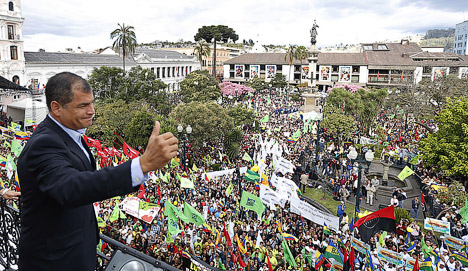
Ecuadorian President Rafael Correa is blowing the whistle. The country may face another coup attempt. There is solid ground to support this allegation. In his March weekly address to the people the President said the protests in Ecuador were staged by enemies of «citizens’ revolution»as the opposition was implementing the strategy of attrition.
According to him, the parties and organizations funded by international structures are subject to the influence of the US Central Intelligence Agency which does its best to create hotbeds of chaos and violence and hinder the creative activities of government. Talking to people, Correa often gives details on the policy of «soft regime change» practiced by Washington in Latin America. According to President, there is a five-phased plan to destabilize Ecuador.
First: public brainwashing (ablandamiento) will be launched by media outlets acting as informal opposition political parties’ mouthpieces. Their mission will be to incite public discontent and then point a finger at the government as the main culprit.
Second: the opposition will try to discredit the government as illegal and acting against the interests of people. To convince people they will launch an intensive propaganda campaign accompanied by thousands of biased publications, dissemination of fake analytical documents and spreading information allegedly received from «reliable» sources. They will also use social networks.
Third: the anti-government forces will heat up street protests by staging manifestations. It does not matter how many protesters will hit the streets. The puppet media outlets will highlight the events as instructed to convince the world that Ecuador is a conflict-torn country.
Fourth: the opposition will use different non-violent methods recommended by Gene Sharp to bring the government down. That is something they are trying to do in Venezuela and Argentina.
Fifth: the opposition will strike at the pillars of power. It will seize government buildings, provoke street unrests, incite discontent among the military etc. The CIA knows how to do it.
It will all be done to make the President go.
Rafael Correa does not make a secret of the fact that he has to counter such hostile actions daily. No matter that, the «citizens’ revolution» has many more supporters than the opposition movement. Correa warned the plotters that any attempts to stage a «color revolution» would be rebuffed. At the same time, he offered a dialogue on burning issues. Rafael Correa is not prone to take unilateral actions. All significant decisions are taken after referendums and nation-wide consultations.
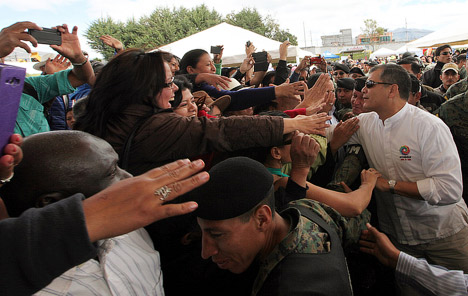
This time the government did not apply enough efforts to explain the new tax that President Rafael Correa presented to the National Assembly (with government party majority), which aimed to levy new taxes on inheritances and surplus value. It was mistaken believing that the opposition could not use it as a pretext for protests because the new measures affected only two percent of population.
The opposition constantly complains about censorship on the part of government, but this time the potential of tycoons who control media was underestimated. Unexpectedly many representatives of middle class took part in the protests that lasted for two weeks under the slogans Ecuador is not Venezuela. There were calls for putting an end to social reforms and resignation of Correa.
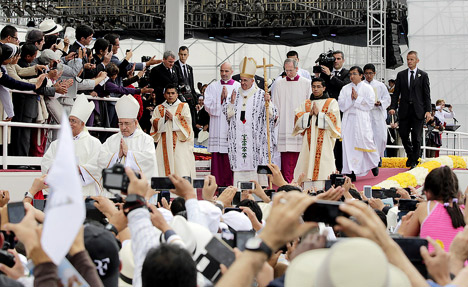
To normalize the situation the President decided to suspend the reforms and hold consultations with the leaders of opposition. He wanted to establish peace before the visit of Pope Francis. The opposition ignored the President’s appeal thinking that he wanted to gain time. The protests continued. The opposition serves the interests of tycoon clans. Incited by right wing media, it is hardly expected to behave differently. In view of rising tensions President Correa and the government decided on June 25 to declare the national dialogue on equity and social justice. The dialogue is supposed to last about three months to discuss what reforms the country needs to meet the aspirations of the majority of Ecuadorians. The mission is to create a society where the common good prevails over personal interests. To fight inequality and preserve peace in the country – these are the goals of the policy adopted by Correa’s government.
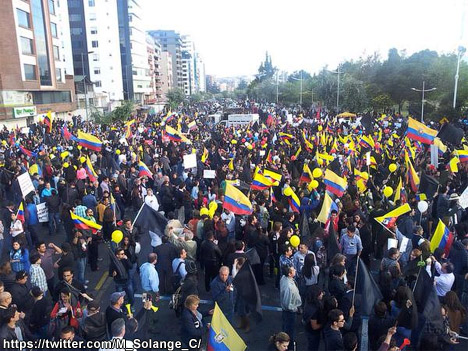
The dialogue was actually refused by opposition. In early June protests took place in Quito,Guayaquil, Cuenca and other cities accompanied by violence and mass disorder. Dozens of stool-pigeons incited tensions. There were people under the influence of drugs and alcohol, some groups of protesters were armed with metal bars, spades and brass-knuckles. Police had difficulty holding the protesters back as they tried to make their way to the presidential Carondelet Palace. No matter all the provocations, there was no excessive use of force against demonstrators while at least a dozen of policemen were taken to hospital gravely wounded.
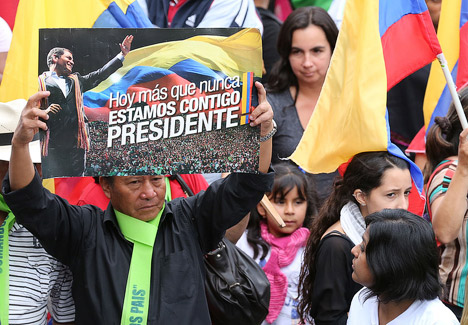
The supporters of Rafael Correa concentrated near the presidential palace creating a live wall on the way of provocateurs. Addressing people from the balcony, Correa warned about the plans of opposition leaders who wanted to destabilize the country organizing a march on Quito.
According to the President, he was ready to defend the «citizens’ revolution» without resorting to violence and lead the nation to peace and democracy. Correa confirmed his decision to run for president in 2017. He offered the opposition to hold a referendum and see if people trusted him. He is still popular, that’s why they want to topple him with the help of «color revolutions» and «maidans» instead of popular vote. Under the circumstances, the US Central Intelligence Agency and the National Security Agency have intensified their activities. Mario Pazmiño, former head of military intelligence, and retired Colonel César Carrión are more frequently mentioned as the people who serve as liaison officers between radical opposition and US special services.
Ecuadorian law enforcement agencies report that the opposition plans include closing the borders and blocking airports in Quito and Guayaquil. Minister of the Interior José Serrano said the opposition exacerbated the situation on purpose to prevent the Pope from visiting the country. It’s doubtful that the leaders of opposition in a Catholic country could make such plans on their own. No doubt, the operation had been planned and prepared by the Central Intelligence Agency. The plans were frustrated.
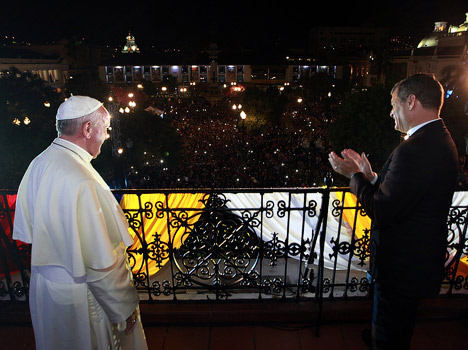
Pope Francis said he never planned to suspend the visit. The mayors of Quito, Guayaquil and the governor of Azuay province are well-known leaders of opposition. They said the confrontation will start again right after the Pope’s visit is over on July 8. Powerful tycoons, banks, Chevron’ HUMINT, the fifth column within power agencies, venal leaders of trade unions, Indians and students’ organizations are involved in the plot. Many non-governmental organizations have intensified activities. The US embassy in Quito works without breaks to implement the Ecuadorian Maidan scenario.
According to him, the parties and organizations funded by international structures are subject to the influence of the US Central Intelligence Agency which does its best to create hotbeds of chaos and violence and hinder the creative activities of government. Talking to people, Correa often gives details on the policy of «soft regime change» practiced by Washington in Latin America. According to President, there is a five-phased plan to destabilize Ecuador.
First: public brainwashing (ablandamiento) will be launched by media outlets acting as informal opposition political parties’ mouthpieces. Their mission will be to incite public discontent and then point a finger at the government as the main culprit.
Second: the opposition will try to discredit the government as illegal and acting against the interests of people. To convince people they will launch an intensive propaganda campaign accompanied by thousands of biased publications, dissemination of fake analytical documents and spreading information allegedly received from «reliable» sources. They will also use social networks.
Third: the anti-government forces will heat up street protests by staging manifestations. It does not matter how many protesters will hit the streets. The puppet media outlets will highlight the events as instructed to convince the world that Ecuador is a conflict-torn country.
Fourth: the opposition will use different non-violent methods recommended by Gene Sharp to bring the government down. That is something they are trying to do in Venezuela and Argentina.
Fifth: the opposition will strike at the pillars of power. It will seize government buildings, provoke street unrests, incite discontent among the military etc. The CIA knows how to do it.
It will all be done to make the President go.
Rafael Correa does not make a secret of the fact that he has to counter such hostile actions daily. No matter that, the «citizens’ revolution» has many more supporters than the opposition movement. Correa warned the plotters that any attempts to stage a «color revolution» would be rebuffed. At the same time, he offered a dialogue on burning issues. Rafael Correa is not prone to take unilateral actions. All significant decisions are taken after referendums and nation-wide consultations.

This time the government did not apply enough efforts to explain the new tax that President Rafael Correa presented to the National Assembly (with government party majority), which aimed to levy new taxes on inheritances and surplus value. It was mistaken believing that the opposition could not use it as a pretext for protests because the new measures affected only two percent of population.
The opposition constantly complains about censorship on the part of government, but this time the potential of tycoons who control media was underestimated. Unexpectedly many representatives of middle class took part in the protests that lasted for two weeks under the slogans Ecuador is not Venezuela. There were calls for putting an end to social reforms and resignation of Correa.

To normalize the situation the President decided to suspend the reforms and hold consultations with the leaders of opposition. He wanted to establish peace before the visit of Pope Francis. The opposition ignored the President’s appeal thinking that he wanted to gain time. The protests continued. The opposition serves the interests of tycoon clans. Incited by right wing media, it is hardly expected to behave differently. In view of rising tensions President Correa and the government decided on June 25 to declare the national dialogue on equity and social justice. The dialogue is supposed to last about three months to discuss what reforms the country needs to meet the aspirations of the majority of Ecuadorians. The mission is to create a society where the common good prevails over personal interests. To fight inequality and preserve peace in the country – these are the goals of the policy adopted by Correa’s government.

The dialogue was actually refused by opposition. In early June protests took place in Quito,Guayaquil, Cuenca and other cities accompanied by violence and mass disorder. Dozens of stool-pigeons incited tensions. There were people under the influence of drugs and alcohol, some groups of protesters were armed with metal bars, spades and brass-knuckles. Police had difficulty holding the protesters back as they tried to make their way to the presidential Carondelet Palace. No matter all the provocations, there was no excessive use of force against demonstrators while at least a dozen of policemen were taken to hospital gravely wounded.

The supporters of Rafael Correa concentrated near the presidential palace creating a live wall on the way of provocateurs. Addressing people from the balcony, Correa warned about the plans of opposition leaders who wanted to destabilize the country organizing a march on Quito.
According to the President, he was ready to defend the «citizens’ revolution» without resorting to violence and lead the nation to peace and democracy. Correa confirmed his decision to run for president in 2017. He offered the opposition to hold a referendum and see if people trusted him. He is still popular, that’s why they want to topple him with the help of «color revolutions» and «maidans» instead of popular vote. Under the circumstances, the US Central Intelligence Agency and the National Security Agency have intensified their activities. Mario Pazmiño, former head of military intelligence, and retired Colonel César Carrión are more frequently mentioned as the people who serve as liaison officers between radical opposition and US special services.
Ecuadorian law enforcement agencies report that the opposition plans include closing the borders and blocking airports in Quito and Guayaquil. Minister of the Interior José Serrano said the opposition exacerbated the situation on purpose to prevent the Pope from visiting the country. It’s doubtful that the leaders of opposition in a Catholic country could make such plans on their own. No doubt, the operation had been planned and prepared by the Central Intelligence Agency. The plans were frustrated.

Pope Francis said he never planned to suspend the visit. The mayors of Quito, Guayaquil and the governor of Azuay province are well-known leaders of opposition. They said the confrontation will start again right after the Pope’s visit is over on July 8. Powerful tycoons, banks, Chevron’ HUMINT, the fifth column within power agencies, venal leaders of trade unions, Indians and students’ organizations are involved in the plot. Many non-governmental organizations have intensified activities. The US embassy in Quito works without breaks to implement the Ecuadorian Maidan scenario.